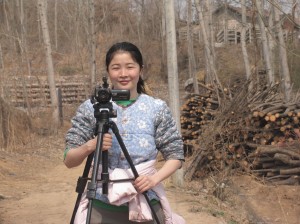
By Ezgi Ustundag
The true story of China’s Cultural Revolution is found not in history books but in the memories of those who survived the Great Famine, says Guo-Juin Hong, co-director of the Franklin Humanities Institute’s Audiovisualities Lab.

“Capturing the real history is a race against time,” says Hong, a scholar of Chinese literature and culture. “There are no official state accounts of the Great Famine—we don’t even know exactly how many people died, and their names and stories will be lost forever in a few years’ time.”
Little known a half-century later in America, the Great Famine of 1959-1961 killed between 20 million and 43 million Chinese, according to different scholarly studies. Coming during the upheaval of the Chinese Cultural Revolution, the famine occurred during a period of drought and bad weather, but many scholars focus blame on the policies of the Communist Party.
Hong hopes “The Memory Project” will help illuminate this blight on China’s history. The project began in 2010 when Wu Wenguang, a pioneer of Chinese documentary film best known for Bumming in Beijing (1990), and his cohort of young filmmakers returned to their native villages in twenty provinces to interview survivors of the Great Famine. By 2013, they had amassed over 1,000 hours of footage.

The project was the focus of Wu and his protégés Li Xinmin, Zou Xueping and Zhang Mengqi’s two-week residency at Duke this October. The residency, which was co-sponsored by Duke University Libraries, included three film screenings, a master class for the MFA program taught by the filmmakers, and a panel discussion featuring the filmmakers, Hong and faculty from Duke’s department of cultural anthropology and the MFA program.
“There’s this very strong activist energy in preserving memories against a highly suppressive state like the Chinese government,” Hong added. “And that’s exactly what Wu Wenguang and his studio have done with ‘The Memory Project.’”
The residency also featured a reception with the filmmakers hosted by Rubenstein Library to celebrate Wu’s donation of the entire body of project interviews. During their time at Duke, Wu and his cohort worked with librarians in Rubenstein and International and Area Studies to catalogue and promote the new collection online.
Both the acquisition of the 1,000-hour body of footage and the university’s relationship with Wu dates back to 2012, when Wu and three filmmakers from his studio came to Duke for the first time as filmmakers-in-residence. The success of the residency two years ago started a dialogue between the Libraries and the filmmakers that culminated in Wu’s decision to donate the complete collection of interviews to Duke.

“Because the oral histories of the Great Famine were totally excluded from state history, the most important thing for these filmmakers is for these memories to be accessible,” Hong said. “This history is going to be secure at Rubenstein, but we’re not hiding it from anyone.”
Hong hopes those who attended the events and use the donated footage in their research will not only learn more about the Great Famine but also realize the amount of information that is still hidden from public view.
“I want this residency to give (members of the Duke community) a good sense of how little we actually know about Chinese state violence in the 20th century,” Hong said. “The goal is not for people to walk out of the screenings knowing everything about the Great Famine but for them to realize that though nobody can ever know the extent of this tragedy, it was very real and needs to be studied.”
Ezgi Ustundag (T’16) is an Arts and Humanities Intern in Duke’s Office of News and Communications. A previous version of this article originally appeared online in DukeToday.

